The German wirehaired pointer is a medium-sized, purebred sporting dog of German origin.
These dogs are protective of their family members, so they make good guard dogs that bond well with their families.
However, these dogs can be too protective and have a tendency to chase cats and other small animals. They will also show aggression towards unfamiliar dogs if not trained from a young age.
German wirehaired pointers typically cost $800 USD.
TABLE OF CONTENTS
What is a German Wirehaired Pointer?

German Wirehaired Pointers (called Deutsch-Drahthaar in German) are medium to large size dogs, descending from griffon type hunting dogs. Griffon dogs had tough, wiry coats and were bred as retrieving and pointing hunting dogs, beginning in Europe in the Middle Ages. The griffons were bred in all sizes, from large dogs used for long hunts in the forests or fields, to small dogs used to chase rodents in large homes.
The German Wirehaired Pointer was perfected as a breed in 19th century Germany by a man named Baron Sigismund von Zedlitz und Neukirch. He wanted to create a dog that could accompany one or more hunters on foot across different types of terrain. Germans at the time loved hunting in dense forests, the Alpine Mountain region, and open fields surrounding farms and villages. This unique breed was achieved by mixing the German Shorthaired Pointer, the Wirehaired Pointing Griffon, the German Rough Haired Pointer, and the hunting Pudelpointer.
The final outcome of the careful breeding was a dog that had a protective “all-weather” coat, a dog that was easy to train, a dog that would enthusiastically track and retrieve wounded game, and that would also be a good guard dog and family pet.
The German Wirehaired Pointer gained popularity over the years, and by the end of the 20th century earned its reputation as an excellent gun dog. In the 1920s, Americans began importing the dog to the US, and it was admitted into the American Kennel Club stud book in 1959.
Appearance
The German Wirehaired Pointer is a medium- to a large-sized, muscular dog with a sturdy stance. Its body’s length is slightly longer than its height. It stands apart from other dog breeds due to its wiry coat and prominent facial hair. This dog has bushy eyebrows, a mustache, and a beard initially needed to protect its face from thorns and bristles as it runs through forests and fields on a hunt. Another unique characteristic of this dog is its webbed feet, which is common to all German pointers.
Traditionally, the German Wirehaired Pointer’s tail was docked, but in many countries today docking is illegal. Removing the dewclaws, however, is usually done. Its eyes are always brown – never yellow, and are oval and medium-sized. Its ears are floppy, rounded, and hang close to the head.
This dog is muscular, agile, and energetic. The German Wirehaired Pointer is known for its good balance, endurance, and resilience – all important traits for hunting dogs. It has a long head and muzzle with a broad nasal bone and open nostrils. With thick paw pads and strong nails, the German Wirehaired Pointer can easily run and maintain traction on any terrain.
German Wirehaired Pointer Weight and Size
German Wirehaired Pointers weigh between 45 and 75 pounds when fully grown. Almost all of his weight is firm muscle.
These dogs reach a height of 24 (females) and 25 (males) inches at their withers. The German Wirehaired Pointer is a generally healthy dog that is not prone to obesity and will live for 12 to 14 years.
Common Colors
German Wirehaired Pointers can be brown or white with black ticking or spots on the body, or reddish-brown with white ticking. They often have large solid patches of color or have a solid color with a white chest.
The head and ears are always brown, sometimes with a white “blaze” on the forehead. His nose and lips are also liver-colored brown and he will have spotting around his lips and mouth. Careful breeding has established that a liver brown German Wirehaired Pointer will never have any black spots, and a black and white dog won’t have a brown nose.
According to the German Wirehaired Pointer Club of America, a totally black may not be a purebred German Wirehaired Pointer, and would be “heavily penalized” in dog shows. But every other country in the world recognizes black as an acceptable color for this breed. When the dog is ticked or roan, it can more easily camouflage itself on a hunt. But experts on breeding the dog understand that different traits come with different color combinations. For example, while totally black dogs tend to scare waterfowl, the black and white combination has proven to be less susceptible to skin infections and irritations.
Bob West, the founder of the Treborwolf Drahthaar Kennels, has been breeding German Wirehaired Pointers since the 1960s and is an expert on identifying and classifying their different colors. West writes on his website, “Coat variables such as coarseness, patterning, follicle density, undercoat density, hair length, and eye color appear to be inherited independently of coat color. In spotted patterns, the white patches appear to have two different situations; the most common form has speckling of dark hairs dispersed within the white patch. It can be evenly distributed and is called roan, or it can be mostly white with an even peppering of dark hairs, and this is called ticked. Another form has few or no dark patches and can be either roan or ticked. Most will have dark heads and ears.” West’s website offers a detailed explanation of the different color combinations of German Wirehaired Pointers.
Coat
The German Wirehaired Pointer has a flat, straight, hard outer coat, and a short, dense undercoat. This double layer of fur protects him from harsh weather conditions as well as injury from thick underbrush. During the winter the undercoat gets very thick, but during the warmer summer months, it is hardly visible.
The outer coat is one to two inches long and is usually wiry. However, there are some German Wirehaired Pointers that have a longer outer coat that is wooly or silky, but still rather coarse. Dogs with short smooth or soft woolly fur are probably not purebred German Wirehaired Pointers.
The shaggy eyebrows, whiskers, and beard on a German Wirehaired Pointer serve to protect its faces from cuts and scratches caused by low, thorny bushes and brush. The dog’s tail is also well insulated with hair, with more on the underside than on top as added protection against injury. However, the tail hairs are not long enough to be feathery or form a plume.
On liver colored German Wirehaired Pointers with white roan or ticking, the liver hairs are shorter than the white ones.
Personality and Temperament

Hunters often need to work alone so as not to scare away potential games, and thus hunting dogs are not always packed dogs. The German Wirehaired Pointer is best suited for hunting alone with his owner – he doesn’t need a pack of dogs to increase his chances of catching his prey. Therefore, by nature, he may at first appear to be aloof, especially towards strangers. However, once he knows who his friends and family are, he will express unwavering loyalty and affection.
Possessive and protective of both his “people” and his toys, the German Wirehaired Pointer will bark and can become aggressive when strange dogs get too close. He will also guard his home and family if he senses danger approaching. But with early socialization you can train your German Wirehaired Pointer to be a friendly dog, taking your cues on expected behavior. If he displays excessively shy or fearful behavior, he isn’t living up to his name and won’t be used for breeding. “Shy” and “German Wirehaired Pointer” can’t exist together in harmony.
The German Wirehaired Pointer is an extremely intelligent and determined dog and will work hard to learn and follow his owner’s commands. His highly sensitive sense of smell helps him track, point, and retrieve in all different terrains, and even in water. German Wirehaired Pointers are eager to please and will follow you anywhere as they thrive on companionship with humans.
While they don’t need other dogs to make them feel secure, they definitely need to spend as much time as possible with their family members to stay happy and well behaved. This breed does not adapt well to kennel living or to multiple handlers, and thus has never been used as an army or police dog.
Search and rescue dog handlers have recently discovered this breed and find them to be excellent workers. That’s not surprising since search and rescue combine their love of people and desire for plenty of physical exercises and mental stimulation.
The German Wirehaired Pointer is a versatile dog who excels in the show ring, many physical competitions, and more. He can be your jogging friend early in the morning and sit around the campfire with you at night. If you like a dog who is intelligent, independent, eager to learn, and willing to please with tons of energy to burn, then you may have found the perfect addition to your household.
Behavior around other dogs
While German Wirehaired Pointers have no need for an animal “friend” in their homes, they can get accustomed to living with other dogs and cats if they are raised with them from an early age.
Due to their powerful hunting instinct, German Wirehaired Pointers are prone to chase cats and other small mammals. They need careful supervision when off-leash outside because a chase can ultimately turn into a kill.
German Wirehaired Pointers sometimes display aggression towards strange dogs. This is particularly pronounced when the male encounters male. If you have established early on that you are in charge, you will be able to calm your German Wirehaired Pointer down before his aggressive feelings are acted upon.
Is a German Wirehaired Pointer a good Family Dog
The consensus on German Wirehaired Pointers is that they are great family dogs. They have stable temperaments, and bond well with one owner or a household full of adults and children of all ages. German Wirehaired Pointers generally choose one person in the family to follow and listen to the most, so if you want the position as the dog’s ultimate boss you should work to establish that status from the time he is a puppy.
While hunting is his favorite activity, being around humans is what a German Wirehaired Pointer craves most when he is off duty. He will love playing with the family children but should be supervised around toddlers. Your German Wirehaired Pointer can get very excited and rambunctious and may unintentionally knock a small child down.
Never let your children play with the dog’s food dish or special toys. It is his nature to be protective of his personal possessions, and you would never want your German Wirehaired Pointer to have a reason to bark or growl at any members of his human “pack.”
If you have children, it is best to adopt a German Wirehaired Pointer puppy, so you can accustom him to living with a large family from an early age. But if you get an older dog, he is intelligent enough to learn appropriate behavior around children.
How to Train a German Wirehaired Pointer
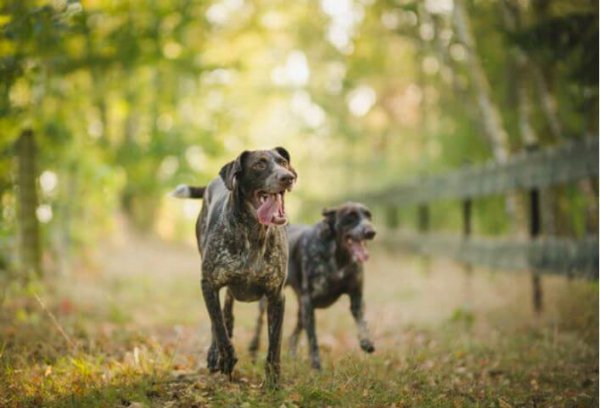
While German Wirehaired Pointers are highly intelligent, they are also highly distractible. Bred to hunt prey that is hiding, they have finely tuned senses of sight, smell, and hearing. Keeping a German Wirehaired Pointer’s attention during the dog training is a challenge in itself.
You can train your German Wirehaired Pointer to find a hidden object in a field, forest, or body of water. But you can also train him to fetch your newspaper off your front porch, or your slippers from your bedroom. The main goal is to feed his appetite for adventure, challenge, and exertion.
German Wirehaired Pointers are naturally curious and will try to please you just to see what will happen at the end of any activity.
The first goal with a German Wirehaired Pointer is to teach him to obey and respect you, and to remain physically calm even if his mind is racing ahead. Once he has been trained to listen and fulfill your commands, you can increase the number of commands he follows.
German Wirehaired Pointers respond well to praise and positive reinforcement, and nothing is gained if you chastise or punish them for mistakes. If your dog truly loves and respects you he will be highly motivated to please you. If he has a strong personality (a good thing), your German Wirehaired Pointer may occasionally challenge your authority and try to express his independence (a bad thing). Stay consistent in your training method and demand for obedience, and you will be able to cut undesirable responses in the bud.
If you don’t like hunting, you can still take advantage of your German Wirehaired Pointer’s high level of intelligence by training him to participate in dog shows and dog sports. In recent years this breed has been trained for search and rescue missions since it loves to hunt and loves being around people.
How to Care For a German Wirehaired Pointer
Exercise Requirements
German Wirehaired Pointers need intensive exercise, and lots of space to burn off their energy. This dog is not suited for living in small homes or apartments and will not enjoy sitting on the couch with you to watch TV for hours on end.
This is an excellent breed to take jogging or swimming, and are enthusiastic jumpers. Make sure your fence is at least six feet tall and that the dog has no way to dig under or around it. If your German Wirehaired Pointer gets bored he will look for a way to escape and take himself on an adventurous walk all alone.
Keep in mind that after burning off a lot of calories during their daily rambunctious activity, German Wirehaired Pointers need more food and water than more sedentary dogs. Always remember to bring extra water for your dog on outings, and especially when the weather is hot.
Grooming and Shedding
If you want a dog you rarely need to groom, the German Wirehaired Pointer is for you. Imagine being a hunter in Germany in the early 1900s, tromping through fields, streams, and wood with your dog, searching for game to bring home for supper. Would you have the time or patience to bathe your dog every week? Do you think there was even a “doggy salon” in the village, where he could take the dog to have its coat trimmed or stripped?
German Wirehaired Pointers have water-repellent coats that dry quickly, and it sheds minimally all year round. So you never need to bathe him unless he is too healthy to come inside – regular brushing is enough to clean off any dry dirt and plant debris. However, his coat will need to be professionally stripped twice a year, since it is usually too time-consuming for the average suburban dog owner.
If you regularly take your German Wirehaired Pointer on outings in rough terrain, his nails will naturally get worn down as he runs and climbs. If he is only able to run on garden grass, you will need to trim his nails every two to three weeks. If you can hear his nails click on the floor in your home, its time for a clipping.
On the other hand, the more fun your German Wirehaired Pointer has outside, the more you will need to comb his whiskers and beard. Use a steel comb to remove food and other dirt on a daily basis if you don’t want your dog to stink. Smelly kisses from even the most loving German Wirehaired Pointer are never pleasant.
Since German Wirehaired Pointers are not initially friendly towards strangers, do everything possible to accustom him to experiences he will have at the vet. Handle his paws whenever you play with him, and get him used to you opening and looking inside his mouth. If you want to be really responsible, wipe your dog’s ears weekly to prevent infection, and brush his teeth at least twice a week. If you are conscientious about your German Wirehaired Pointer’s weekly grooming needs, you won’t need to give him a full-body bath more than once or twice a year, and you will ensure that he enjoys optimal health.
Any time you do anything to groom or clean your German Wirehaired Pointer, reward him with treats and praise for his tolerance and submission. This will prepare him for good behavior for the times he needs to go to the vet or be examined at a dog show.
What To Feed A German Wirehaired Pointer
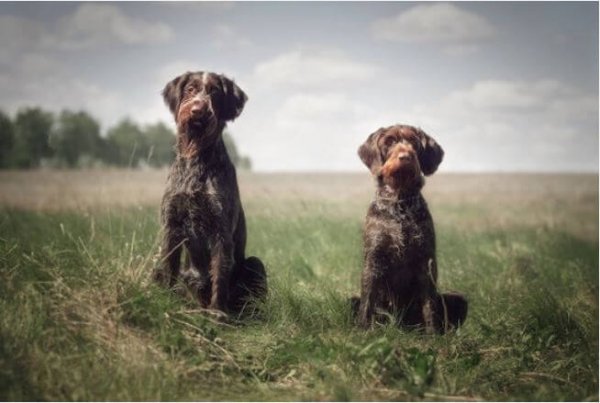
German Wirehaired Pointers are special dogs, and they need special food. They should be fed high-quality food with sufficient calories and protein for active dogs. The type of food should be appropriate for your dog’s age – puppy, adult, or older dog.
A German Wirehaired Pointer eats between 2/12 to 3 cups of dry dog food per day, split into two meals. Don’t be tempted to buy a cheaper brand of food, because if it has fewer nutrients your dog will need large amounts of food per day so satisfy his appetite and nutritional needs. In the long run, “cheap” will end up more expensive.
It is ok to feed your German Wirehaired Pointer table scraps, but make sure not to feed foods that will harm his health. If you are worried that your dog is gaining too much weight, spread your hand across his back with your thumbs meeting at his spine. If you can feel his ribs with your fingers, but can’t see them, your dog is a good weight. But if you can see his ribs he is too thin, and if you can’t feel them he is too fat!
An overweight dog needs more exercise, while an underweight one should be examined by his vet to make sure he doesn’t have an underlying condition preventing him from absorbing the nutrients in his food.
Please note that a German Wirehaired Pointer is different from a German Shorthaired Pointer, which has different nutritional needs.
Known Health Problems
Purebred dogs are more prone to health problems than mixed breed dogs. Non-hereditary conditions German Wirehaired dogs can develop as they age are Hypothyroidism, Cataracts, Dilated cardiomyopathy (DCM), and Lipoma. Genetic eye conditions that develop in German Wirehaired Pointers are progressive retinal atrophy, entropion, ectropion. Two other genetic health issues for this dog are hip dysplasia and epilepsy.
Before choosing a puppy, ask to see what hip and elbow scores its parents received from the Orthopedic Foundation for Animals. Scores are Excellent, Good, or Fair. Also, ask to see certification from the Canine Eye Registry Foundation that the puppy has healthy eyes.
You can also buy a puppy registered in the Canine Health Information Center Program of the German Wirehaired Pointer Club of America. In addition to a documentation from the OFA and the CERF exams, dogs in this program also receive an OFA thyroid test and a DNA test for von Willebrand’s disease. Dogs who undergo these tests have the results published in the CHIC database, and the results become public information.
A short description of health problems faced by German Wirehaired Pointers appears below, in alphabetical order.
Bloat:
The German Wirehaired Pointers are a deep-chested breed and are therefore prone to developing bloat. The professional term for this life-threatening condition, which causes the dog’s stomach to twist and inflate with gas, is Gastric dilation-volvulus (GDV). The best way to avoid this condition is to make sure your dog never eats too much in one meal, and rarely eats human leftovers.
Cataracts:
There is no way to predict or prevent cataracts in a German Wirehaired Pointer. This debilitating condition begins to develop when your puppy is between 6 and 18 months old and eventually leads to blindness.
Dilated cardiomyopathy (DCM):
This is a heart condition that many large breed dogs suffer from. It is a disease that attacks the heart muscle fibers. The symptoms of DCM are various degrees of coughing, difficulty breathing, weakness, loss of appetite, pale gums, increased heart rate, and fainting. It affects dogs between the ages of 4 and 10, and males more often than females. Different drugs can be used to prolong the life of a dog suffering from DCM, but ultimately if your German Wirehaired Pointer has this disease, his death will be sudden and fast.
Entropion / Ectropion:
Entropion causes a dog’s eyelids to roll inward, which then causes his eyelashes to irritate the cornea. This is quite common among German Wirehaired Pointers. While there is no cure, it is also not a life-threatening condition. It can be treated with surgery, depending on the cause of entropion and the severity of your dog’s symptoms. A dog with entropion will exhibit excessive pawing and rubbing of his eyes, squinting, sensitivity to light, tearing, and sometimes corneal ulceration or the formation of dark brown pigment on the cornea.
Ectropion causes a dog’s eyelids to roll outwards, and again, is common in German Wirehaired Pointers. This condition also irritates the cornea, and the symptoms are similar to the symptoms of entropion.
Epilepsy:
If your German Shorthaired Pointer has epilepsy, and it wasn’t inherited from one of its parents (ask your breeder about this before buying a pup), then it can be caused by brain lesions that developed as the dog grew. A dog suffering from epilepsy can have seizures at any given moment, day or night, and even have them while sleeping. Each seizure lasts for between 30 to 90 seconds. German Shorthaired Pointers commonly experience cluster seizures, at regular intervals, every 1 to 4 weeks.
Hip Dysplasia:
Compared to many other large breeds, German Wirehaired Pointers are not likely to suffer from hip dysplasia. However, while only 9% of German Wirehaired Pointers develop hip dysplasia, that is still twice the rate of a similar dog, the German Shorthaired Pointer. About 3% of German Wirehaired Pointers develop elbow dysplasia in their lifetimes. This condition causes pain and lameness in your dog, and there is no good long-term treatment for it other than surgery in extreme cases.
Thyroid Disease:
Data collected in the Michigan State University Thyroid Database indicates almost 25% of German Wirehaired Pointers exhibit thyroid disease. The signs of this disease in dogs are similar to those that humans experience – hair loss, weight gain, dry skin, and personality changes such as sudden fearfulness or aggression. Treatment is as simple as giving your dog a daily pill to replace the depleted hormone.
Von Willebrand’s Disease:
This severe blood clotting condition appears in German Wirehaired Pointers, as does hemophilia. Only dogs that carry the recessive mutated VWF gene risk the chance of passing the disease on when breeding, or of suffering from the disease themselves. Responsible breeders will test for this gene, and will not breed dogs that are carriers. But sometimes the disease shows up if testing wasn’t done, or if you buy your puppy from a breeder that failed to test.
German Wirehaired Pointers with Von Willebrand’s disease bruise easily, have frequent nosebleeds, and experience bleeding for longer than expected after being injured or undergoing surgery. If not monitored, the bleeding can be excessive enough to cause death. German Wirehaired Pointers suffering from this disease can live full lives with a normal lifespan, but need to be watched for cuts or other injuries that could lead to out of control bleeding.
Buyer’s Guide
| Pros | Cons |
| Alert watchdog that will bark when strange people or animals approach | Suspicious of strangers and takes time to warm up to new people |
| Very minimal snoring, barking or drooling | High maintenance in terms of meeting his exercise and mental stimulation needs |
| Brave, confident, eager to “work” for you | A strong hunting instinct may cause him to chase and catch cats |
| Loyal and devoted to his owner | If left alone too often for too long, he can develop separation anxiety and engage in destructive behaviors |
| Energetic, robust, healthy, and always ready for adventure | Can show aggression towards other dogs, especially male-to-male |
| Will cheerfully accompany you everywhere and participate in almost any activity | Bred to be an outside dog, he may be difficult to house train |
How to Choose a German Wirehaired Pointer Puppy
If you decide you want to buy a German Wirehaired Pointer Puppy, the first thing you need to do is locate and contact several reputable breeders. Good breeders test dogs before breeding them to make sure they don’t carry genetic diseases and also evaluate them for good temperaments.
Another way to know that a breeder is good is that there is a waiting list for his litters. A breeder who has a whole litter of puppies waiting to be adopted is a breeder who hasn’t built a name for himself and possibly even has a poor reputation.
The best way to choose a German Wirehaired Pointer puppy is to visit the breeder at least once, and if possible several times. Make sure the kennels are clean and dry, that the dogs are friendly and excited to greet visitors. The breeder should be able to provide you with names of people who have bought dogs from him, as references. And you should be introduced to the litter’s mother, so you can see how she interacts with the puppies and get a sense of her temperament.
Before choosing the puppy you want, if you can’t personally visit the breeder ask him to send you photos and videos of the litter. Next, ask for copies of the pedigree and registration papers of the litter’s parents.
Be prepared to meet some of the breeder’s requirements as well. A serious breeder won’t send a valuable German Wirehaired Pointer to a home that isn’t equipped to give it the care he needs. You may be asked about the size and location of your home, and who will be the primary caretaker and trainer for the dog. The breeder will also want to know if you have already researched and chosen a vet and a trainer for the puppy.
When signing a contract to purchase a puppy, make sure that the following details are included:
- The name of the puppy’s breed (in this case, German Wirehaired Pointer)
- The puppy’s birthdate, and registration documents
- A photo of the puppy, and if possible photos of his parents
- Authorization signed by a vet stating the puppy is healthy
- Shipping or pick-up arrangements, including the date when the contract will go into effect
- A clause allowing you to return the puppy to the breeder if for any reason you can no longer care for it
You will also be asked to commit to certain conditions when purchasing a German Wirehaired Pointer. You will probably have to sign a clause in the contract stating you will neuter or spay the puppy at the earliest possible age unless you are purchasing a dog that will be bred itself.
It is possible to know what color your puppy will be as an adult, but the length of a puppy’s coat is shorter than an adult’s. Until it is fully grown, you won’t know for sure what type of coat your German Wirehaired Pointer will have.
How Much Do German Wirehaired Pointers Cost?
There are German Wirehaired Pointer breeders in the United States and Europe. The average price for this dog is approximately $800. The cost can increase or decrease depending on a number of factors:
- the size of the litter
- whether or not the dog has been trained
- how much the dog has been socialized with people and other dogs
- the dog’s lineage, and whether or not it has breeding rights
- supply and demand in the area where you make your purchase
- the breeder’s location
If you want a German Wirehaired Pointer that is not only healthy and attractive but also comes from a superior breed line and is authorized for continued breeding, you may end up paying $1500 dollars or more for your puppy.
It is not recommended to buy a dog being sold without any papers at all, because there is no guarantee it is a purebred German Wirehaired Pointer. And if the dog is not purebred, there is no way to know which good traits it failed to inherit, and which bad traits it brings with its mongrel genes.
Summary
If you want an energetic dog that’s a lot of fun to spend time with, a German Wirehaired Pointer is a good choice. This is a perfect dog for anyone who loves hiking and exploring outdoors, who will appreciate the breed’s high level of intelligence and fine-tuned instincts that send him hunting on every routine walk.
You need to be a strong, assertive person if you want to own a German Wirehaired Pointer, otherwise, he will be dragging you along on his leash and deciding where to go and what to do. You also need to be prepared to give and receive an abundance of love. German Wirehaired Pointers are known to great their owners with frenzied wagging tails and exuberant licks on the face.
This is not a dog for people who want to go to the park and sit on the bench stroking a lap dog while chatting with a friend. German Wirehaired Pointers are movers and shakers. If you stop walking while outside with your German Wirehaired Pointer, you better be prepared to at least start throwing a ball for the dog to run after and fetch.
There isn’t much downtime with this breed, because even at home a German Wirehaired Pointer will love playing with toys in the most exciting and energy expending games you can devise.
If you happen to love hunting, then you are the optimal owner for a German Wirehaired Pointer. He will gladly accompany you on every hunt and can be trained to track and retrieve almost any bird or mammal you shoot or trap. He will fearlessly approach and chase live game, using his quick wits to outsmart even the most cunning prey, such as foxes.
No matter how you spend your time with your German Wirehaired Pointer – whether you are really hunting or just pretending with a stick of ball – remember to give him lots of attention and praise. You will earn his love and loyalty even when you don’t always match his level of prowess or fully take advantage of his skills as a tracker and hunter!



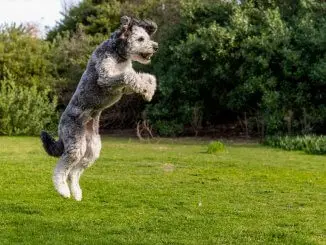
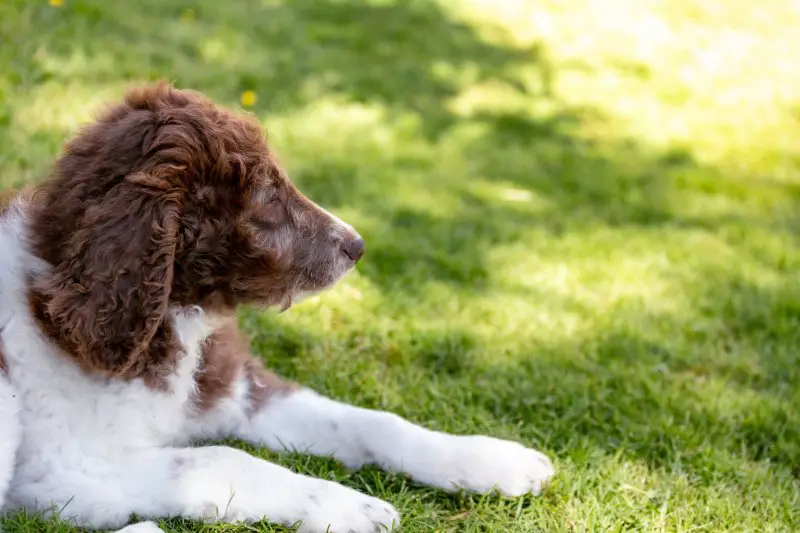

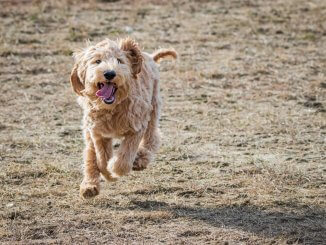
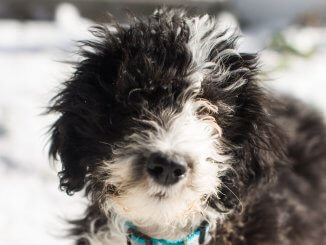
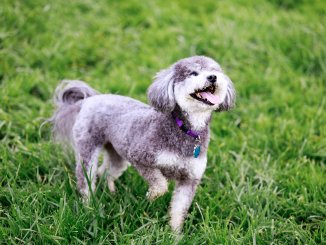

Be the first to comment